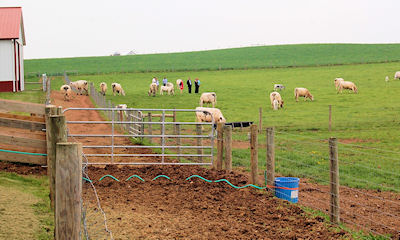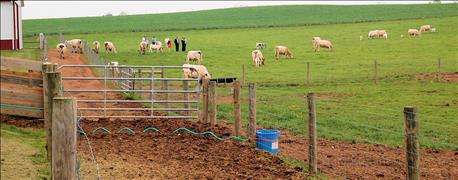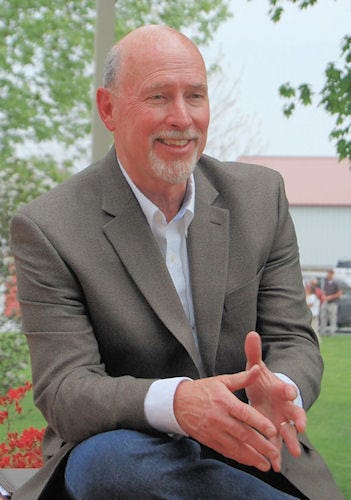
Terra Rubra Farm was a fitting site for last week's roll-out of USDA's round-two Chesapeake Bay watershed funding of the Regional Conservation Partnership Program. Deputy Ag Secretary Krysta Harden joined state and regional ag and conservation officials in marveling over Bill and Debra McGrew's grassed and grazed farm at Keymar, Md.

CLEAN AND GREEN: Terra Rubra Farm is fully stocked with cattle plus conservation best management practices.
The rolling 150-acre beef cattle and hay farm sits in the Monocracy River watershed. The whole-farm conservation model is complete with a riparian forest buffer system, a stream crossing, a grassed waterway, a watering facility, manure storage, heavy use area plus fencing, designed in part by the Carroll County Soil Conservation District. The McGrews also placed it under a conservation easement.
Harden's visit was to raise awareness of round-two funding of the $235-million RCPP, the newest conservation funding tool of NRCS. "There's new money on the table, and it'll be exciting to see who comes to the table and what kind of partnerships we'll see."
Bring on the bucks
That new money is mostly USDA's. Partnership dollars from private sources haven't yet been put on the table for round two. The deadline for partner preproposals is July 8. Harden expects private contributions will increase now that results of round-one funding are becoming apparent.
She also noted that the number of first-round applications for on-farm projects were six times that could be funded. And she expects even more for funding round two plus three future funding rounds.

BONUS FUNDING: Those putting in buffers get vouchers for other best management practices, says Al Todd, executive director of the Alliance for the Chesapeake Bay.
Al Todd, executive director of the Alliance for the Chesapeake Bay, acknowledged that RCPP's first round was "a bit of an experiment. The RCPP is an opportunity to expand the work via private partners. We have many private partners who are joining with us to do the outreach to local farmers." In round one funding, the Alliance and its partners received $1.5 million for its Mason-Dixon Working Lands Partnership. Its partners included the Stroud Water Research Center, conservation districts, Baltimore City Reservoirs, Glatfelter Pulpwood and the Maryland Forest Service. They provided funds and technical assistance for nutrient management plans, riparian forest buffers and buffer fencing, principally in Maryland's Carroll, Frederick and Washington counties and Pennsylvania's Franklin County.
Other RCCP round one projects
Here's a quick peek at the other three Chesapeake watershed critical conservation area projects funded:
* Accelerating Chesapeake Bay Watershed Implementation Plans: Maryland Department of Agriculture is the lead partner.
~~~PAGE_BREAK_HERE~~~
To meet a large unmet demand for conservation programs for meeting the Chesapeake Bay watershed quality goals, this project will utilize state implementation plans to accelerate targeted, cost-effective conservation in Delaware, Maryland, and Virginia. In Maryland, high-resolution imagery will help prioritize locations for riparian buffers as part of the Chesapeake Bay Riparian Forest Buffer Initiative. Delaware offers vouchers to offset the cost of buffers through the Buffer Bonus Program.
* Comprehensive Watershed Conservation in Dairy and Livestock Landscapes of the Chesapeake Bay: The National Fish and Wildlife Foundation is the lead partner.
Partners rewards agricultural producers in Virginia, West Virginia, and Pennsylvania for implementing higher impact, priority conservation practices in targeted subwatersheds and counties. The approach addresses both water quality degradation and inadequate habitat for fish and wildlife through comprehensive conservation planning, conservation practice implementation, and strategic habitat restoration. An agency-neutral conservation brokerage was proposed to best address resource concern. The partners will also use cost-benefit targeting to focus financial assistance dollars
* Delmarva Whole System Conservation Partnership—From Field to Stream: The Nature Conservancy and the Delaware Maryland Agribusiness Association are the lead partners.
This public-private partnership in Maryland, Delaware, and Virginia uses a science-based approach to achieve significant environmental objectives: 1) improve water quality through advanced nutrient management practices on acres and restoring, enhancing, and protecting acres of natural filters (wetlands and buffers); and 2) expand wildlife habitat by enhancing, restoring, and protecting acres of high quality wetlands and buffers.
For more information on first-round projects, visit the 2014- 2015 projects homepage.
Interested farmers and landowners should contact their local NRCS office. In some projects, participation by landowners makes them eligible for bonus funding.
About the Author(s)
You May Also Like




